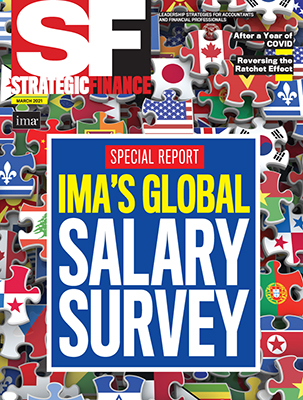The COVID-19 pandemic has challenged leaders across the globe and thrust them into a difficult situation fraught with tremendous uncertainty and stress. Laura K. Murray, a psychologist at Johns Hopkins University, said, “Leadership will be one of the most heavily tested skills throughout the coronavirus pandemic” and that emotional intelligence, also referred to as emotional quotient (EQ), is a critical leadership skill for navigating the new normal. EQ is the ability to identify and manage one’s own and others’ emotions to help overcome challenges, resolve conflicts, and relieve stress. According to psychologist Daniel Goleman, EQ is characterized by five factors: self-awareness, self-regulation, motivation, empathy, and social skills. He reported that almost 90% of the difference between top-notch and average leaders was attributed to their distinct levels of emotional intelligence.
Under normal circumstances, management accountants’ jobs may be stressful. They need to pay attention to detail, face deadline pressures, work long hours, keep up with technical updates, and serve stakeholders who don’t understand accountants’ responsibilities. These challenges may cause them to be overly emotional in stressful situations and collaborate or communicate poorly. This behavior compromises composure and demonstrates a lack of soft skills. Times of crisis call for accountants to demonstrate high EQ to support their organizations’ finance teams and business operations. The good news is that you can raise your EQ.
IQ VS. EQ
Effective leaders may have high intelligence, but do they also demonstrate EQ? According to business strategist Patrick Stroh, a former member of the IMA® Global Board of Directors, leaders may be smart, but that doesn’t guarantee effectiveness in managing people. He believes that possessing high EQ is a better predictor of performance in participative management, self-awareness, building relationships, confronting problems, and change management. It isn’t enough to possess accounting skills, organizational knowledge, business and technical expertise, and experience in management positions if they don’t have strong EQ. They also need to motivate their organization’s personnel by checking their egos at the door and showing they care about the team. EQ helps leaders understand people and their motivations, which in turn helps them to work cooperatively with different individuals. Operating in the global economy requires a business leader who can read people, sympathize with them, and negotiate effectively. That requires EQ.
LEARNING EQ
While there may be a genetic component that predisposes some individuals to stronger EQ, Goleman believes it can be learned and tends to improve with age and maturity. Thus, accountants with more work experience should demonstrate higher EQ compared to recent graduates. If character traits inhibiting managers’ EQ can be identified, then coaching and self-awareness can help them to overcome weaknesses. He provides an example of an executive whose colleagues felt she had little empathy for her coworkers. A coach helped the executive improve her listening skills, leading to improved EQ. No amount of coaching will make a difference, however, unless there’s a commitment to improve these soft skills.
Marcine Johnson, former dean of the IMA Leadership Academy, recommends that management accountants reflect on their EQ skills by answering the following questions: What are my EQ strengths? What areas of EQ could I improve? How will my company and I benefit from my being more emotionally intelligent? What actions will I take to strengthen my EQ?
FedEx Express has integrated EQ into its global management training program. An action-based EQ training approach was selected to develop skills to enhance the effectiveness of day-to-day operations. It’s centered around a three-step approach to build learnable competencies: “Know yourself” focuses on developing self-awareness of your reactions and responses to various situations; “choose yourself” addresses replacing your unconscious responses and reactions with intentional ones; and “give yourself” emphasizes aligning your actions to the organization’s larger purpose. All of these competencies focus on a key factor of the company’s success: achieving speed in operations balanced with collaborative decision making by strengthening managers’ EQ.
IMA underscores that EQ is an important skill in its Management Accounting Competency Framework. Under the Leadership domain, the section “Motivating and Inspiring Others” stresses that it’s important to “influence, motivate, and gain support of others in order to achieve organizational goals through the use of emotional intelligence, accountability, and setting the ‘tone at the top.’”
Seattle University provides a creative approach to developing EQ with an experiential learning course. Students, alumni, and guests spend a week in Ortisei, Italy, to enhance their EQ. The participants’ EQ is assessed prior to the course, providing the basis for strengthening each dimension of the EQ quadrant through self-reflection, group activities, and peer coaching.
BETTER LEADERSHIP
Strengthening EQ and other soft skills will benefit accountants and their organizations because they’ll provide better leadership, more effective collaboration, and deeper empathy, helping to inform decision making and meet organizational goals.
Developing EQ requires understanding other people’s perspectives and feelings. You must be willing to commit to changing your own behavior by developing intuition and self-awareness to understand and manage situations. During times of crisis, this soft skill will help management accountants to navigate the stress of uncertainty and deadline pressure. As Stroh says, boosting your EQ is more of an art than a science.
The opinions included are the author’s, not necessarily those of the U.S. Air Force Academy, the U.S. Air Force, or any other federal agency.
IMA LEADERSHIP ACADEMY
The IMA® Leadership Academy provides leadership opportunities for all members. From leadership assessment to leadership courses offered in person as well as through WebEx to participation opportunities in mentoring, be it reverse or traditional, the IMA Leadership Academy can help you meet your leadership goals and improve your leadership skills. For more information, please visit the Leadership Academy website.

March 2021

